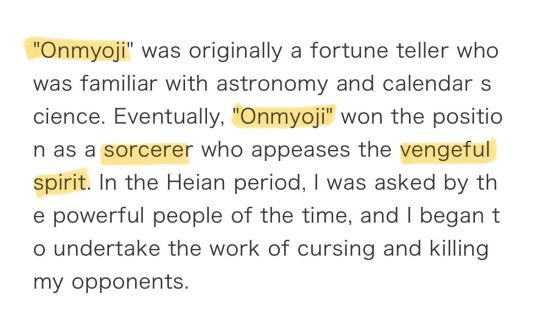#i logged into jstor (for naught but a simple proverb but it was still fun)
Text
i fell into a little rabbit hole while reading bora chung's cursed bunny when i found the japanese proverb 「人ひとを呪のろわば穴あな二ふたつ」 ("hito o norowaba ana futatsu"), meaning "when you curse a man, [you dig] two graves" (click here for reference and click on the first link at the bottom for more context). it's a cautionary proverb about the consequences of cursing or invoking evil onto others, similar in a way to the english proverb "what goes around comes around."
i dug around some more (hah!) and found an article explaining the origins of the proverb (click on the second link at the bottom). do bear with my lacking skills when it comes to translating, but from what i understand, the proverb itself originated from the heian period. onmyoji (click on the third link at the bottom) were civil servants who practiced onmyodo, specializing in magic and divination. the article describes them using the kanji 呪術師 (third highlight in the left image), or jujutsushi, meaning sorcerer.


these onmyoji were responsible for calendar-related tasks and mystical duties such as divination, but the most interesting duty listed was protecting the capital from evil spirits, or 怨霊を (vengeful spirit) as the article cites, by cursing and killing the capital's opponents. now, this was a particularly dangerous task because they risked having that curse "returned" back to them in a counter-attack, killing them in the process, too—hence why one must prepare two graves when one resorts to "cursing" someone.
now that we've established the history of the proverb, it initially struck me as familiar because...


it's something geto mentioned when he came to the school to declare war! and...


later on when he says his last words to gojo!
given that the series takes some inspiration from onmyodo in the heian period (the golden age of jujutsu in the story), it's befitting that a proverb like this would make an appearance in the actual dialogue. in both instances, the proverb was relevant in geto's dialogue.
the article i referred to before also provided two example sentences related to the proverb, which when translated become:
"As there is a saying that if you curse people, there are two graves, hatred only produces unhappiness."
"I hate him so much. Even if you say that if you curse people, you will have two graves, I'm prepared for that."
as the geto fanatic that i am i find it interesting that both these phrases could align with geto's lines in volume 0. the first time geto references this proverb, it's when he says, "let's curse each other to our hearts' content." i've talked about this in my other posts (click here for one of them), that i've always believed that geto knew his pursuit of ideal was futile, or "impossible" as he explained to gojo in shinjuku. regardless of the outcome, this was the path he chose for himself, a path where he had to constantly pretend to the people around him that it was indeed possible.
referring to the proverb, the two graves here would be geto and the subject of his curse, non-sorcerers. his curse—his hatred—only led to his own unhappiness and his own demise. as it is, he failed his attack and the only grave there was his. he died unable to laugh from the bottom of his heart.
the second time geto references this proverb, it's when he says, "at least curse at me a little at the very end." he says this in an easy exasperation in response to gojo's omitted last words to him. he expects gojo to hate him or at least be angry with him, but instead gojo does not "curse" him the way he thought he'd be.
refering to the proverb, geto expects gojo to hate him so much, he'd curse him even if it might risk his own life to see geto dead. instead, gojo spares him—or rather, gojo says what he says honestly, without the disguise of anger or spite. the two graves here, at least in geto's mind, would be gojo and the subject of his curse, geto himself. ironically, despite the lack of "curse," there is still a grave for one body. in a more figurative sense, perhaps that alley is a teeming graveyard.
what an apt cautionary proverb for such a vengeful character.
links i couldn't hyperlink:
#jjk#jujutsu kaisen#geto#gojo#satosugu#lobotomy kaisen#icb i see them everywhere#well at least i'm packed with more knowledge#i logged into jstor (for naught but a simple proverb but it was still fun)#why cannot i hyperlink#jjk meta
48 notes
·
View notes